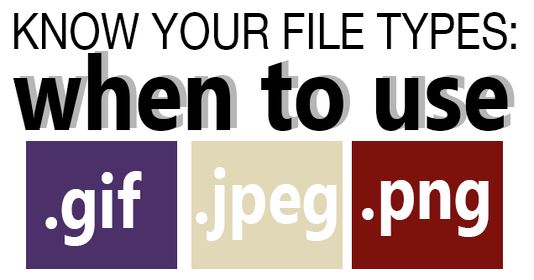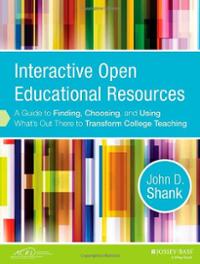submitted by Ryan Johnson

GIF
Gif stands for “graphics interchange format” and was created by CompuServe in 1987 to transfer images quickly across slow connections. There has long been a public debate over whether it’s pronounced “gif” or “jif,” but creator Steve Wilhite says call it “JIF!”
Some quick facts: It uses 256 indexed colors and dithering, a process where two pixel colors combine to make one to reduce the number of colors needed. It can be interlaced, and progressive loading shows a low-quality image first and then better detail is added. It allows for single-bit transparency–one color can be chosen to be transparent. It can be animated. It uses lossless compression, aka few colors means files start even smaller than JPEG and compression does not lose any data.
Best uses: web graphics with few colors, small icons, animations, simple images.
JPEG
Pronouced “jay-peg,” it stands for “joint photographic experts group” and was designed by this group in 1986. It used a very complex compression algorithm to reduce file size. Sixty percent to 75% compression is usually optimal for website usage. And it is often used when a small file size is more important than maximum quality. The human eye doesn’t see color details as well as it does light and dark differences, so some of these color details can be sacrificed to save file space.
This is the standard file format of most digital cameras because it can display millions of colors and has a 16-bit data format. It lets image detail be “forgotten” and then filled in when displayed, but it also called “lossy” compression for the loss of data. This file type is compatible across many platforms (PC and Mac), and other programs (web browsers and image editors) making it very versatile.
Best uses: still images only, real-world images like photos, complex coloring, shading of light and dark.
PNG
Png stands for “portable network graphics” and was designed in the mid-1990s as a way around patent issues with the GIF format, and includes benefits from both GIF and JPEG. It has lossless compression–so, no data loss!
PNG-8 is very similar to GIF. It uses 256 colors and 1-bit transparency; however, PNG-8 files are even smaller than GIF files. PNG-24 uses 24-bit color which is similar to JPEG. It can include over 186 million colors! These files use alpha-channels and allow transparency to be set on a scale between opaque and completely transparent, which creates a faded, translucent look. Sadly though, some older browsers may have trouble supporting PNG files because of these alpha channels.
Best uses: web images such as logos that involve transparency and fading, images in the middle of the editing process, complex images like photographs if file size is not an issue.
There is such a variety of image file formats that I didn’t even go over today available to use. Using the right format for your images to save quality and space on your computer and in your emails and websites is crucial.








